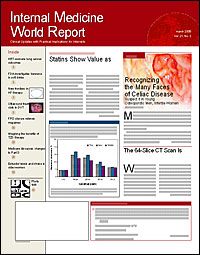Surprising Data Question Purported Efficacy of Saw Palmetto
Disappointing, and surprising, results have been reported for saw palmetto, a popular herbal extract often recommended for men with an enlarged prostate gland. Many previous studies have shown benefit with this extract, but these new data (N Engl J Med. 2006;354:557-566) suggest it is no more effective than placebo.
This 1-year double-blind study included 225 men with benign prostatic hyperplasia (BPH) and was conducted by Stephen Bent, MD, of the San Francisco VA Medical Center, and Andrew Avins, MD, MPH, of the Northern California Kaiser Permanente Division of Research in Oakland. Participants were randomized to saw palmetto, 160 mg, or placebo twice daily for 1 year.
Symptoms (and side effects) were assessed at regular intervals using the American Urological Association Symp?tom Index (AUASI) and objective measures of urinary function.
Similar results were reported between the 2 groups in AUASI score changes, maximal urinary flow rate, prostate size, residual volume after voiding, quality of life, and serum prostate-specific antigen levels.
No differences em?er?ged between saw palmetto and placebo even when considering patients grouped by symptom severity or prostate size.
"The results of this study clearly do not support a strong clinical benefit of saw palmetto for BPH," Dr Bent noted. "However, whether other doses, formulations, or patient populations might respond differently is unknown."
Dr Bent recognized that these results are surprising, but he pointed to crucial differ?ences between this study and earlier ones. "Previous studies were generally small in size and short in duration," he said. "Plus, the vast majority of them did not use the standard symptom score that we used for assessing the severity of BPH."
It is estimated that >2 million men in the United States use saw palmetto for BPH, which, according to the National Institutes of Health, affects >50% of men aged >60 years and almost all (>90%) men >70 years old.
Another potential problem with earlier research has to do with the plant itself. "This is a very pungent herb, and it took our research team a long time to create a placebo that convincingly duplicates its strong smell and taste. We suspect that previous trials didn't adequately address that problem," Dr Bent explained. As a result, "it's possible that some of the positive findings in earlier work may be due to the fact that the blinding wasn't adequate."
At the end of this study, 40% of men taking saw palmetto believed they were taking the herbal extract compared with 46% of those taking placebo.
The saw palmetto used in this study con?tained the levels of fatty acids and sterols believed to constitute the extract's active ingredients. The 160 mg twice a day dose was used in nearly all previous studies.
"This is a surprising finding that contradicts a weight of previous evidence," Dr Bent said.
